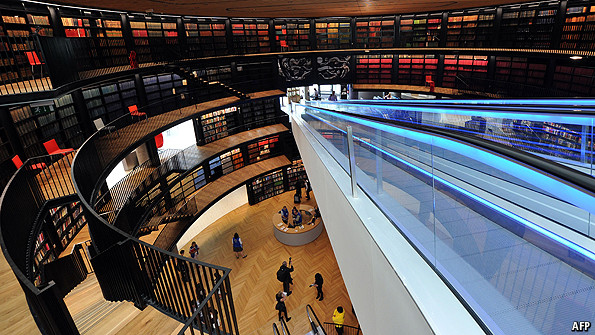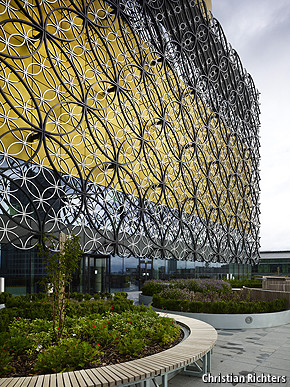The Economist - Prospero - Books, arts and culture

THIS week Birmingham opened its impressive new library with an impassioned speech by Malala Yousafzai, the Pakistani teenager shot by the Taliban for campaigning for women’s right to education. “Let us not forget that even one book, one pen, one child and one teacher can change the world,” she said. The city is hoping that this massive metal-clad building—which cost £189m ($295m) and is 20% larger than its predecessor—will be a cornerstone for redefining Birmingham’s image. Brian Gambles, the library’s director, echoes this sentiment: “We wanted to create a building that shouts out learning and culture.”
The Library of Birmingham is one of a new breed of “super-libraries” that are springing up while many smaller branches fight for survival. By offering a wider range of services, spaces and facilities the idea is that larger multi-functional libraries are better suited to the needs of a diverse community of 21st century users, and able to offer culture and entertainment, as well as learning and information.
“We have moved away from a transactional service to a transformational one,” explains Mr Gambles. The modern library is a place where people can do some research and borrow a book, but also where a budding entrepreneur can get advice on setting up a business (its target is to create 500 new start-ups a year) or a family can attend a musical performance.
Throughout ten stories visitors will find more than 400,000 books (hundreds of thousands more are stored in the archives), a dedicated children’s library, reading spaces, an art gallery, a multimedia centre, two cafés, a music library, a performance space, green outdoor terraces, a shop and a gallery.
Books are not an afterthought but they are not the raison d’être they used to be. Much like the best-designed shopping centres, each of the lower floors allow views onto the next floor through a system of interlocking rotundas and moving walkways, enticing you further into the building. Mr Gambles calls it a “journey of discovery and serendipity”. At ground level the foyer connects with the Birmingham Reparatory Theatre (the two spaces also share a new 300-seater performance venue).
More

No comments:
Post a Comment